Generators in ECMAScript provide a way to write iterator functions using the yield keyword. This allows for writing functions that can be iterated over manually or used to create infinite streams. Generators also enable asynchronous programming using coroutines instead of callbacks. They allow for cooperative multitasking by starting multiple generator functions as "threads" that yield values in a nondeterministic order. Array comprehensions are also proposed as a shorthand for transforming arrays using generators.
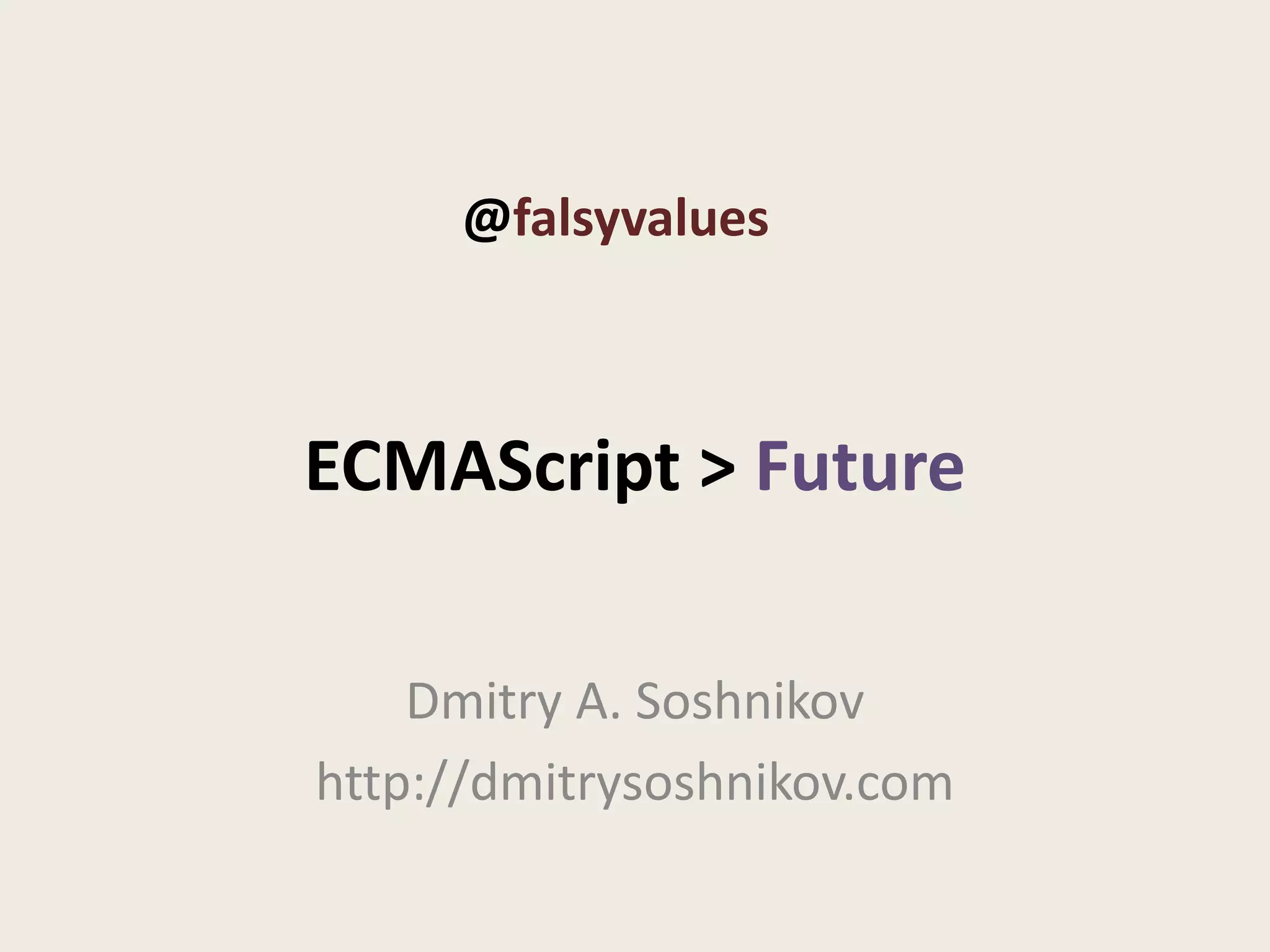


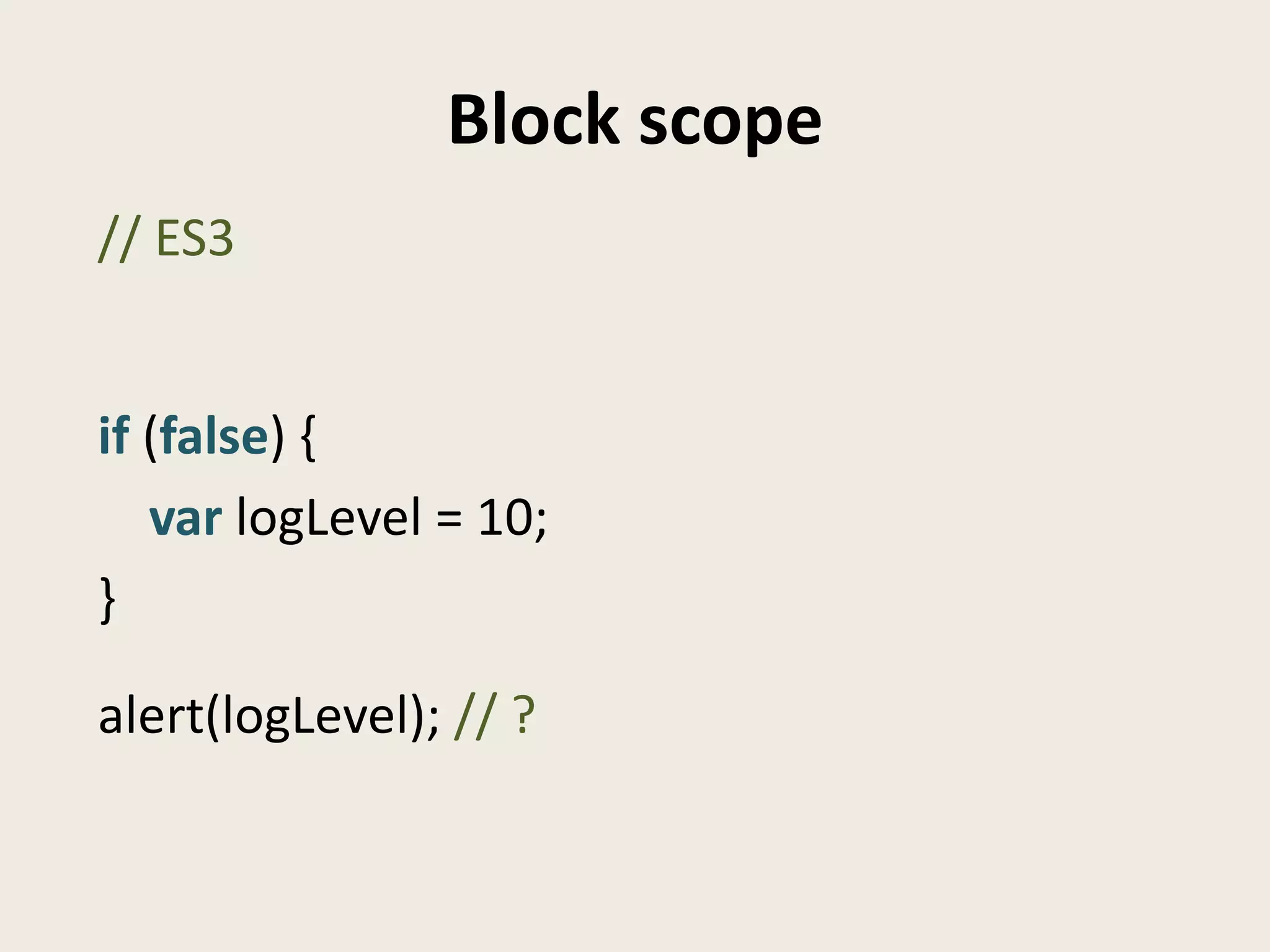
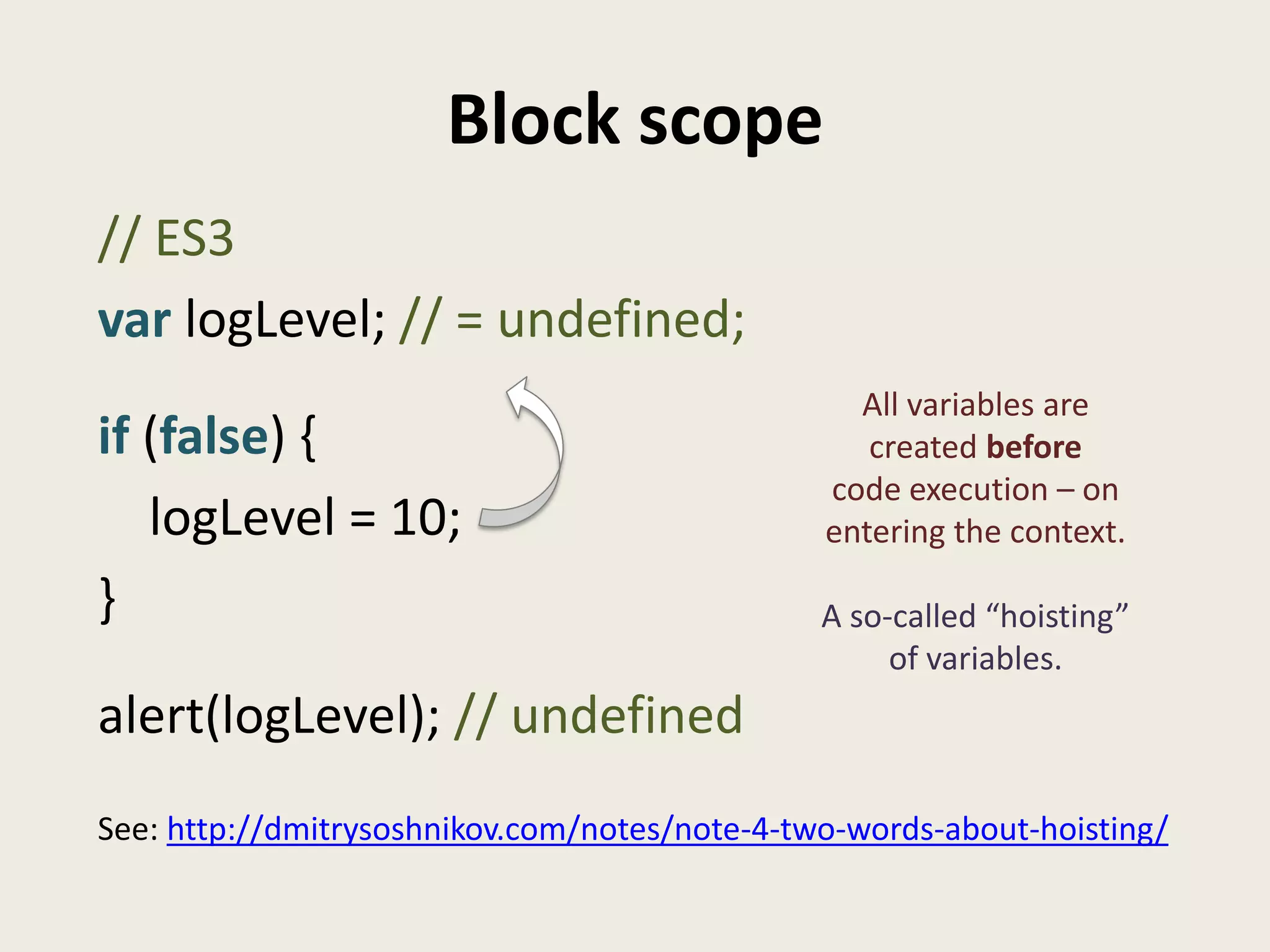
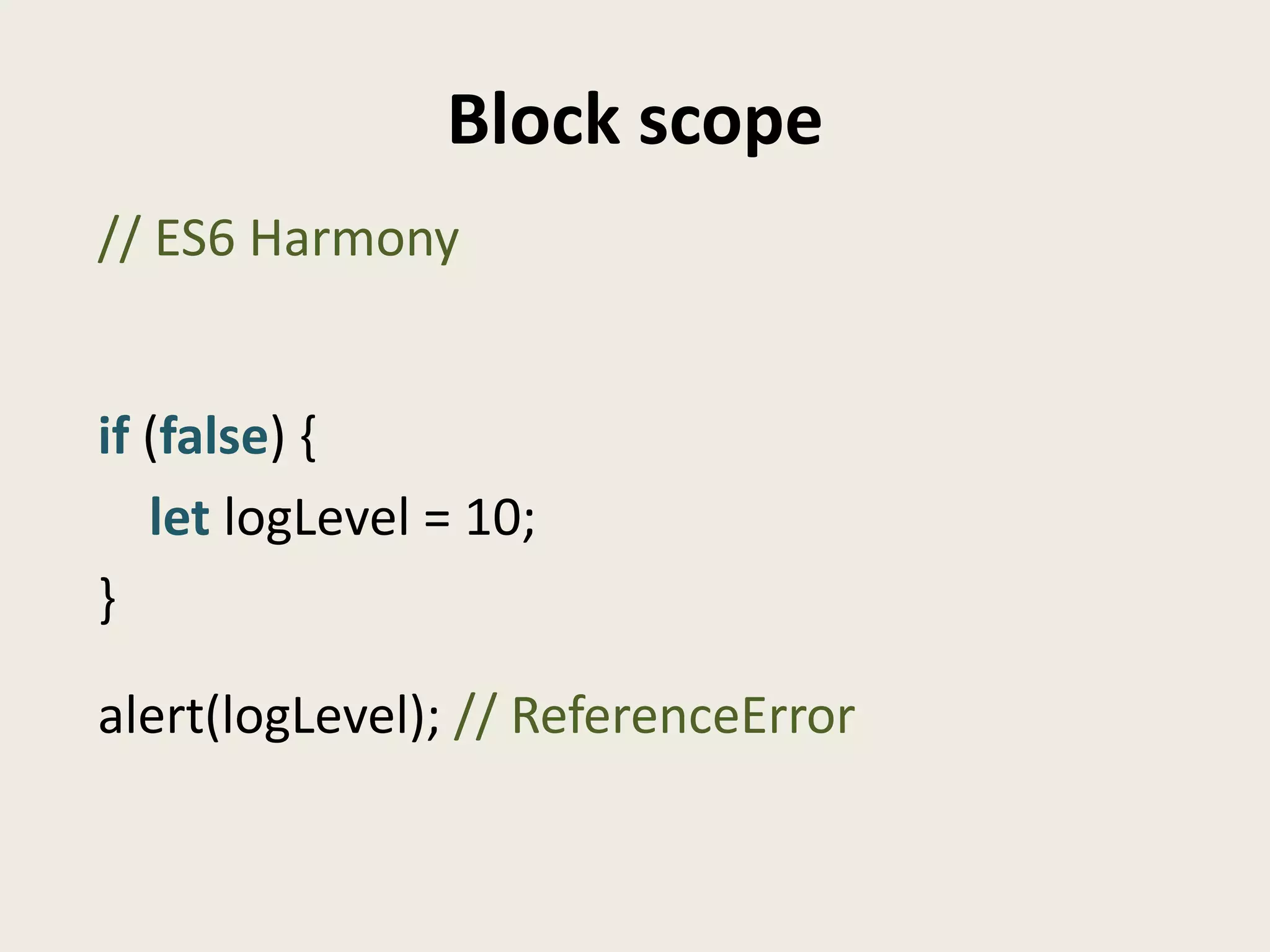
![Block scope
// ES3, ES5
var handlers = []; handlers[0](); // ?
handlers[1](); // ?
for (var k = 0; k < 3; k++) { handlers[2](); // ?
handlers[k] = function () {
alert(k);
};
}](https://image.slidesharecdn.com/falsyvalues-dmitrysoshnikov-ecmascript6-110521101237-phpapp01/75/FalsyValues-Dmitry-Soshnikov-ECMAScript-6-7-2048.jpg)
![Block scope
// ES3, ES5
var handlers = []; handlers[0](); // 3
var k; handlers[1](); // 3
for (k = 0; k < 3; k++) { handlers[2](); // 3
handlers[k] = function () {
alert(k);
};
}](https://image.slidesharecdn.com/falsyvalues-dmitrysoshnikov-ecmascript6-110521101237-phpapp01/75/FalsyValues-Dmitry-Soshnikov-ECMAScript-6-8-2048.jpg)
![let : block scope
ES3, ES5 ES6
for (var k = 0; k < 3; k++) { for (let k = 0; k < 3; k++) {
let x = k;
(function (x) {
handlers[x] = function () {
handlers[x] = function () {
alert(x);
alert(x);
};
}; }
})(k);
}
handlers[0](); // 0 handlers[0](); // 0](https://image.slidesharecdn.com/falsyvalues-dmitrysoshnikov-ecmascript6-110521101237-phpapp01/75/FalsyValues-Dmitry-Soshnikov-ECMAScript-6-9-2048.jpg)
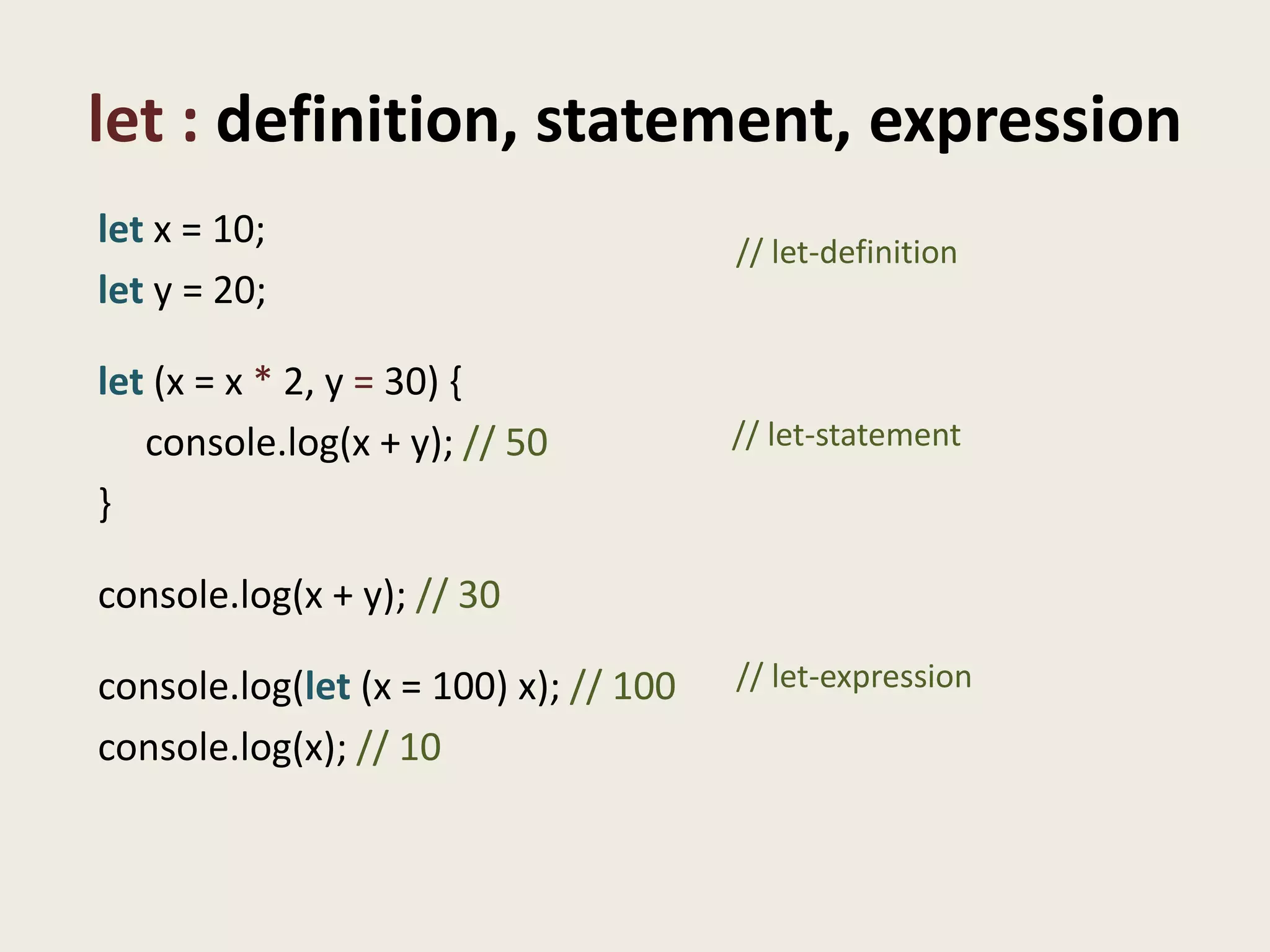

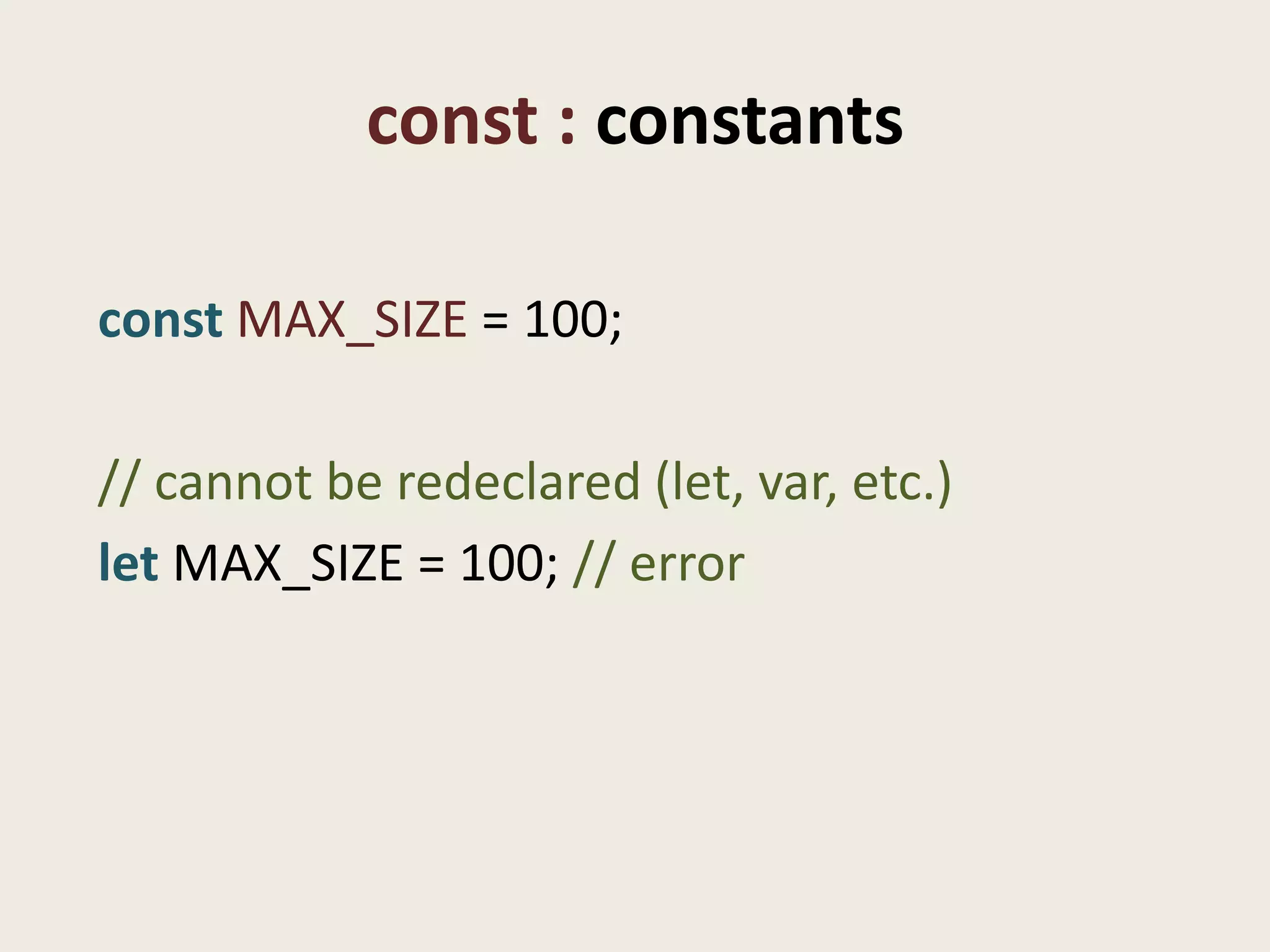
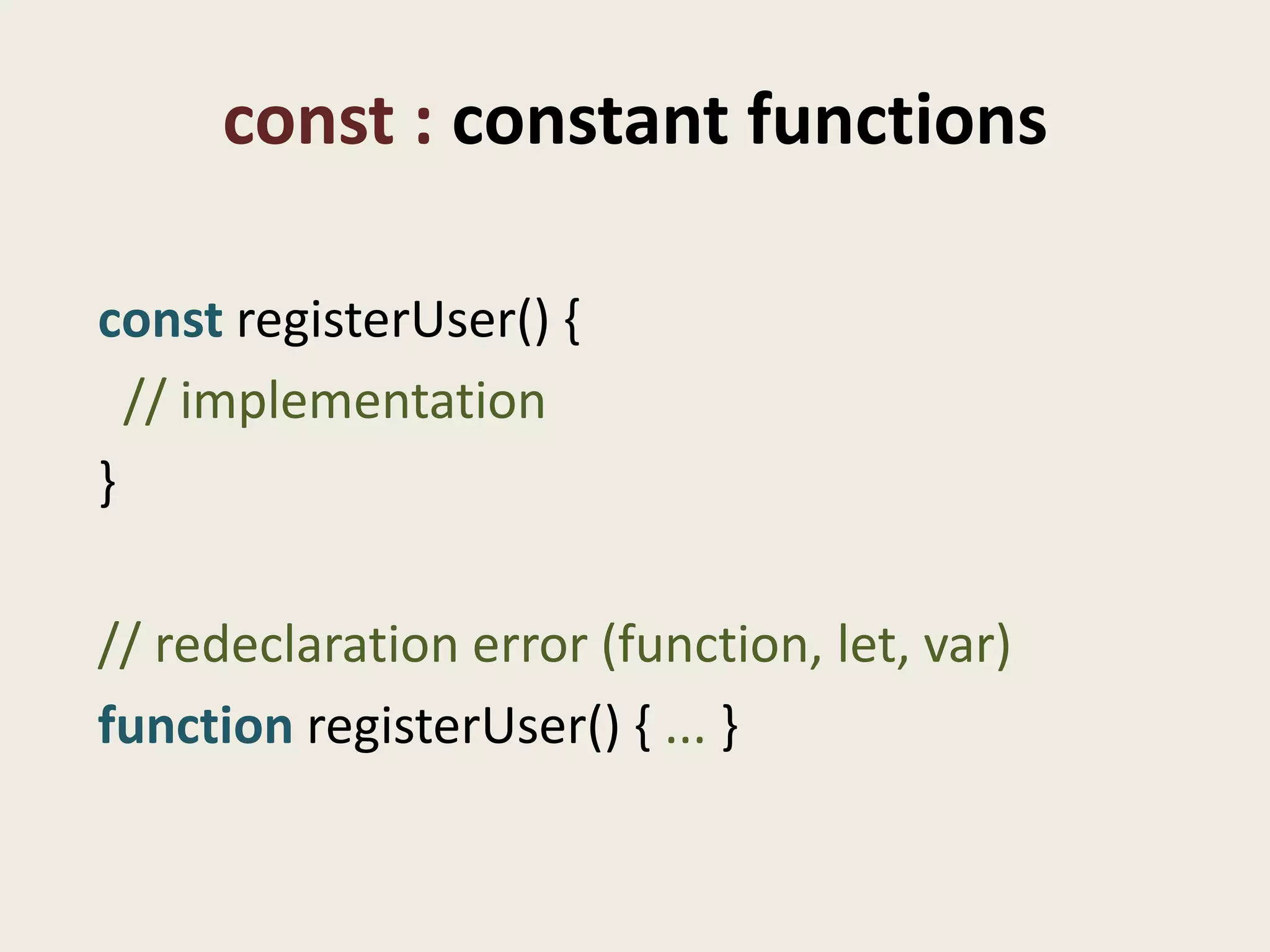
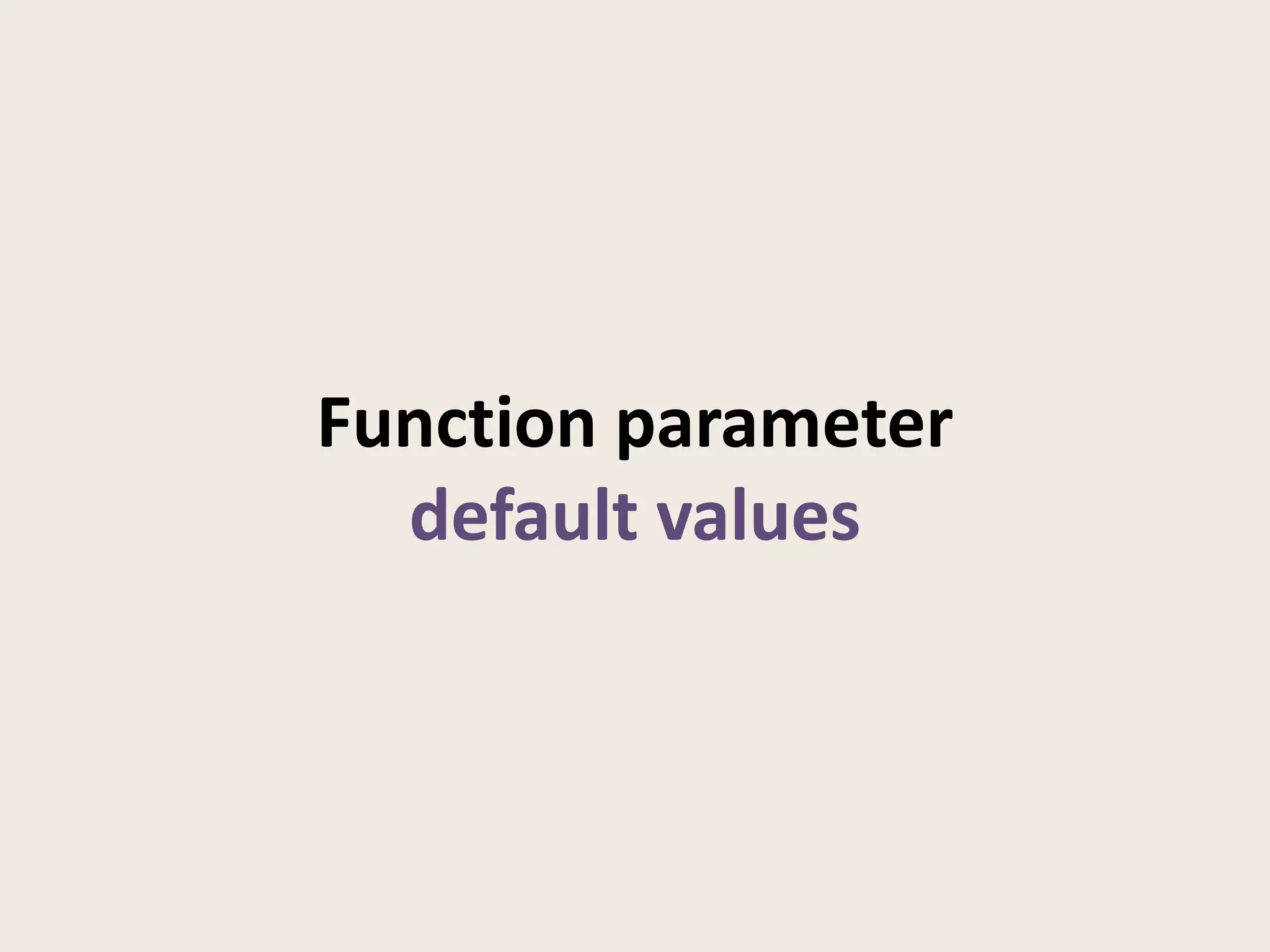
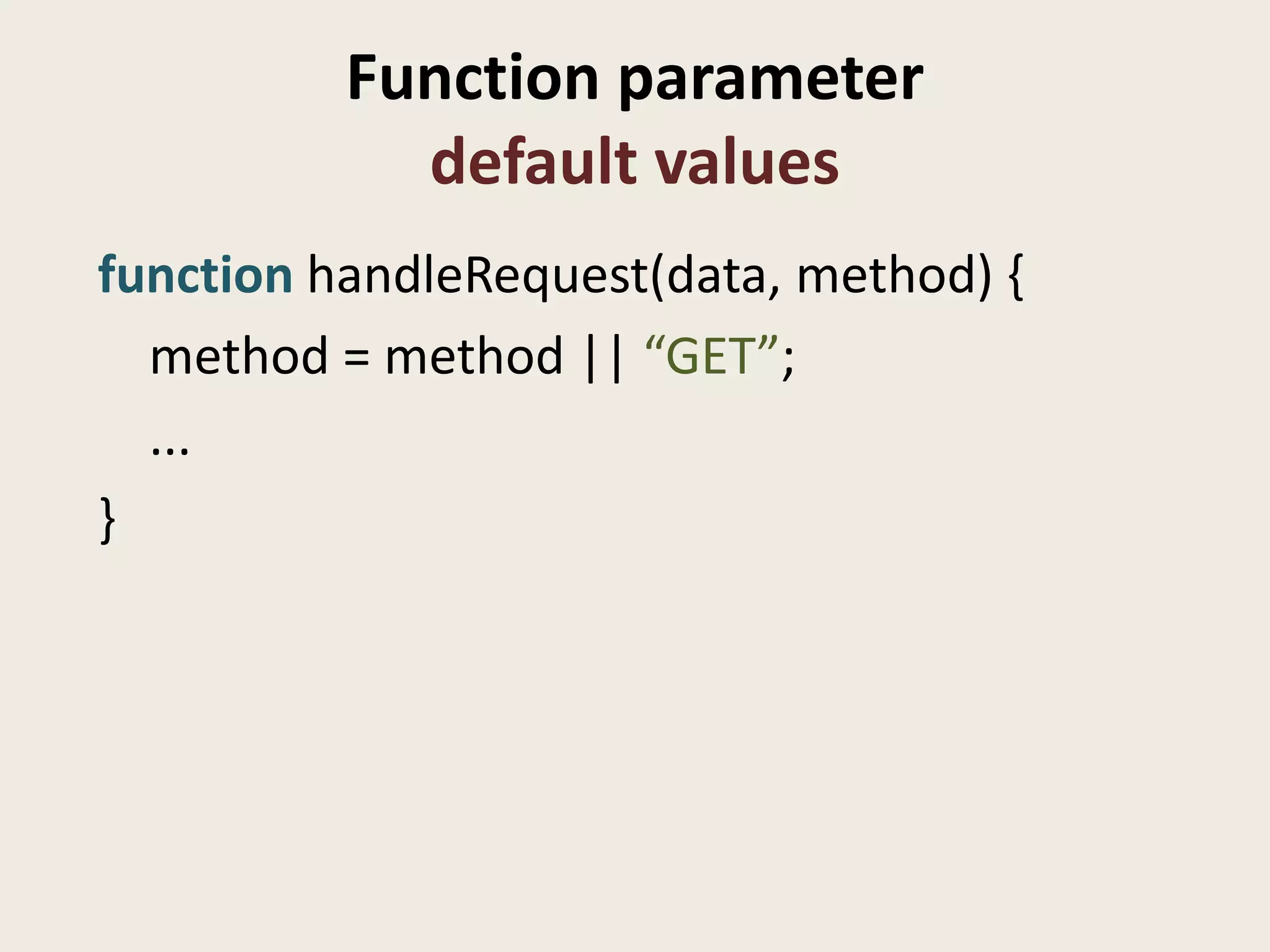
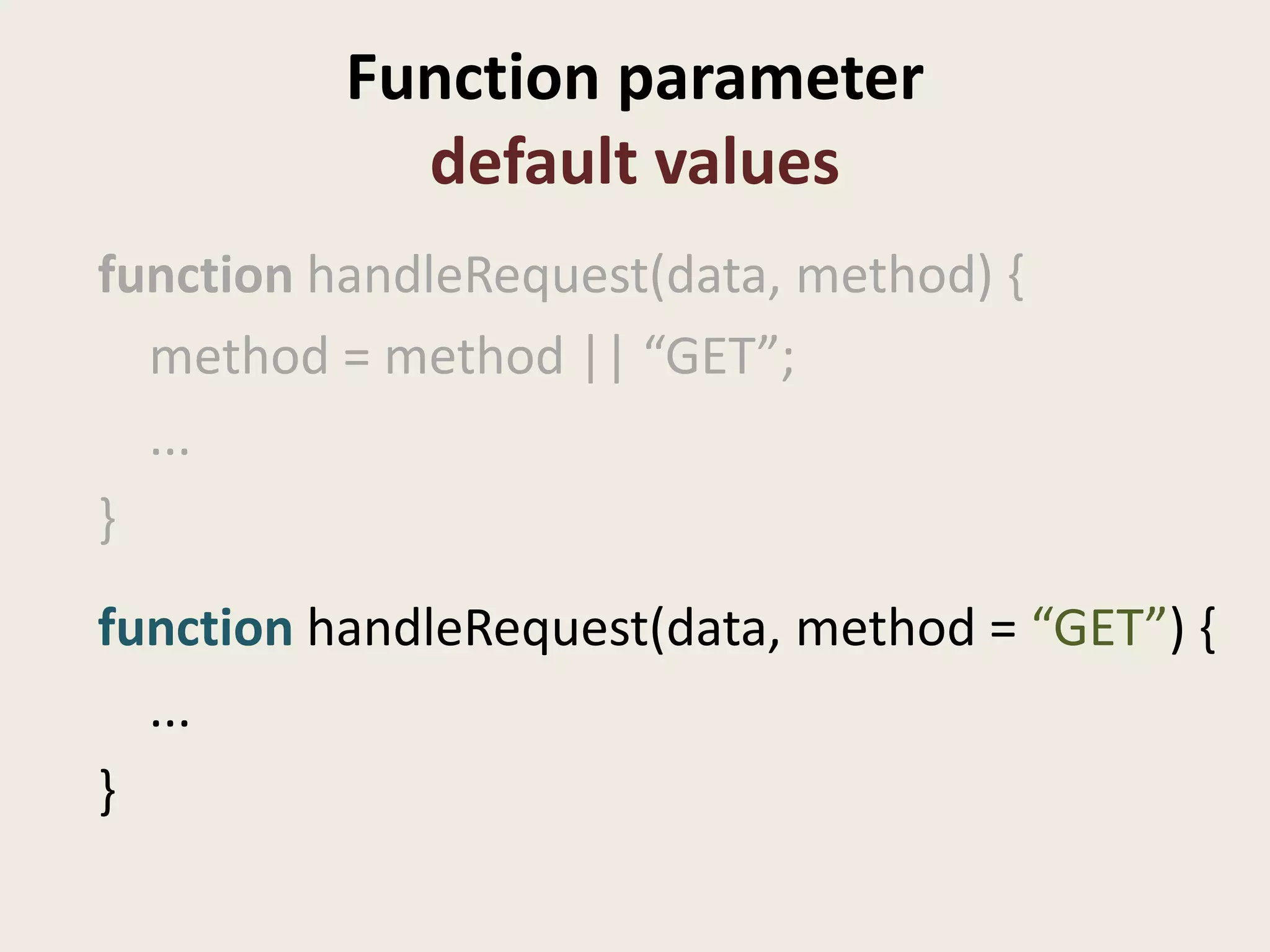
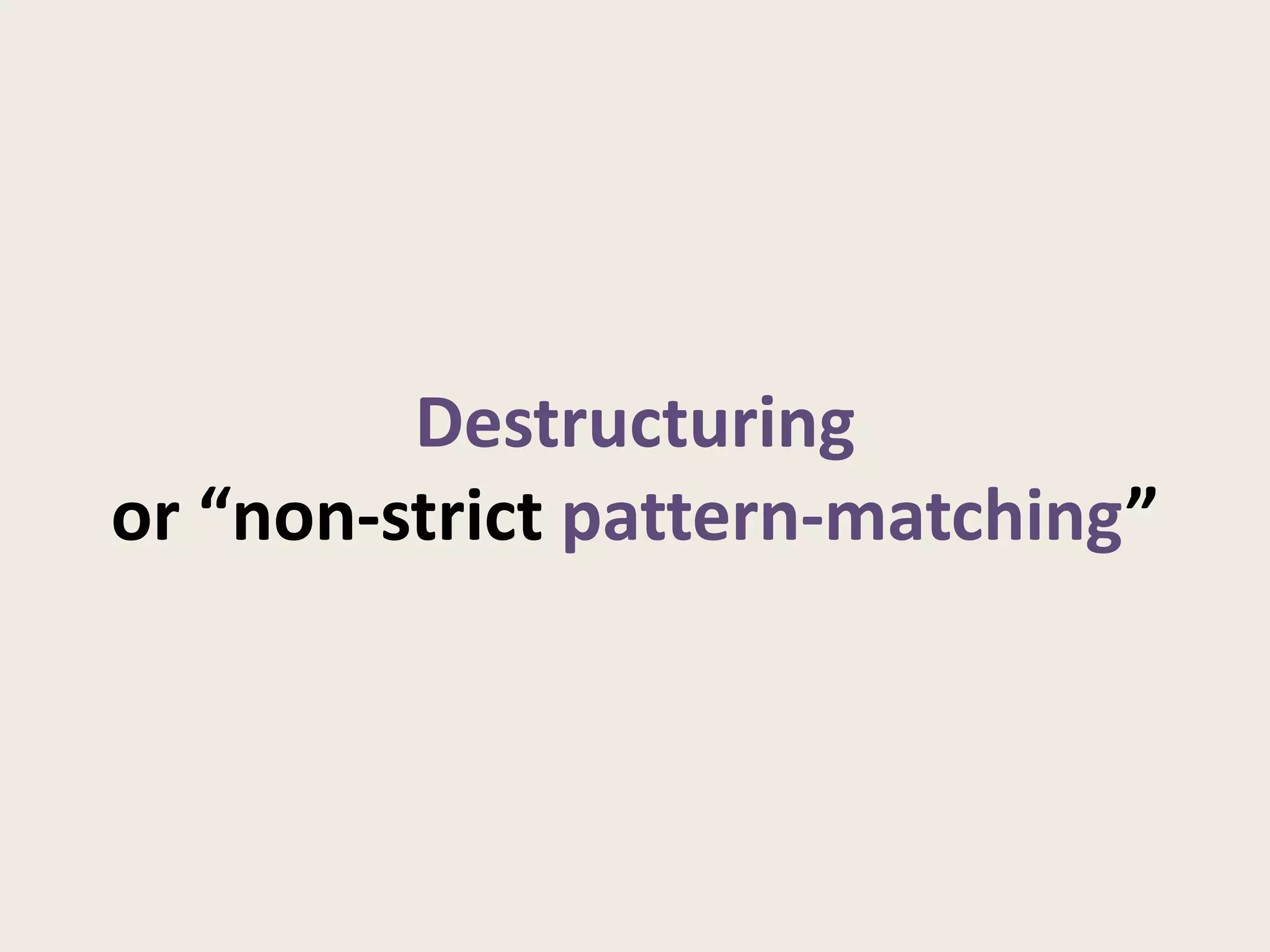
![Destructuring: arrays
// for arrays
let [x, y] = [10, 20, 30]; // non-strict matching
console.log(x, y); // 10, 20](https://image.slidesharecdn.com/falsyvalues-dmitrysoshnikov-ecmascript6-110521101237-phpapp01/75/FalsyValues-Dmitry-Soshnikov-ECMAScript-6-18-2048.jpg)
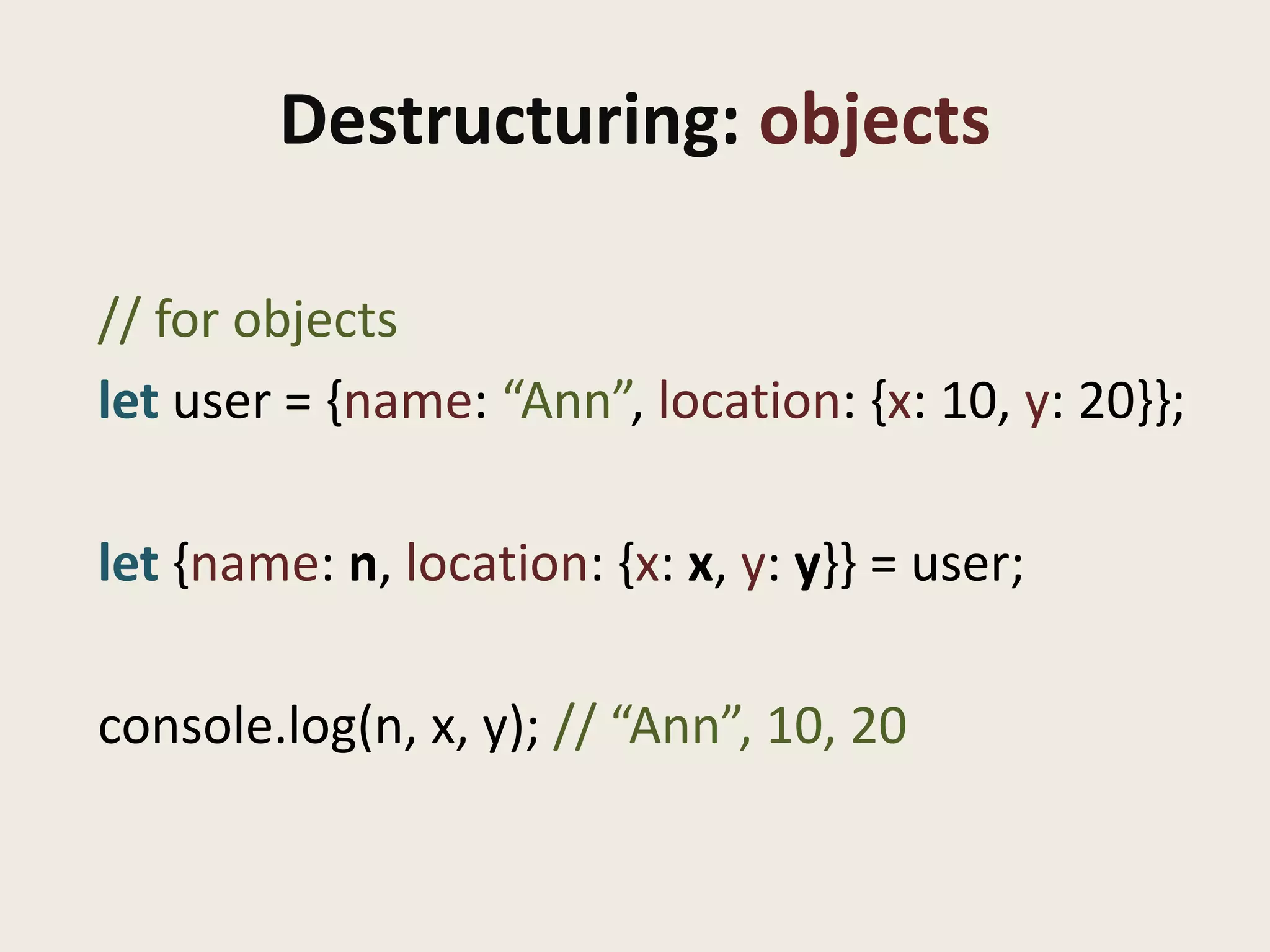
![Destructuring of
function parameters
function Panel(config) {
var title = config.title;
var x = config.pos[0]; Too “noisy”
var y = config.pos[1];
return title + x + y;
}
new Panel({title: “Users”, pos: [10, 15]});](https://image.slidesharecdn.com/falsyvalues-dmitrysoshnikov-ecmascript6-110521101237-phpapp01/75/FalsyValues-Dmitry-Soshnikov-ECMAScript-6-20-2048.jpg)
![Destructuring of
function parameters
function Panel({title: title, pos: [x, y]}) {
return title + x + y;
}
let config = {title: “Users”, pos: [10, 15]};
new Panel(config);](https://image.slidesharecdn.com/falsyvalues-dmitrysoshnikov-ecmascript6-110521101237-phpapp01/75/FalsyValues-Dmitry-Soshnikov-ECMAScript-6-21-2048.jpg)
![Destructuring:
exchange of variables
// exchange two variables without third?
let x = 10;
let y = 20;
[x, y] = [y, x]; // easy](https://image.slidesharecdn.com/falsyvalues-dmitrysoshnikov-ecmascript6-110521101237-phpapp01/75/FalsyValues-Dmitry-Soshnikov-ECMAScript-6-22-2048.jpg)
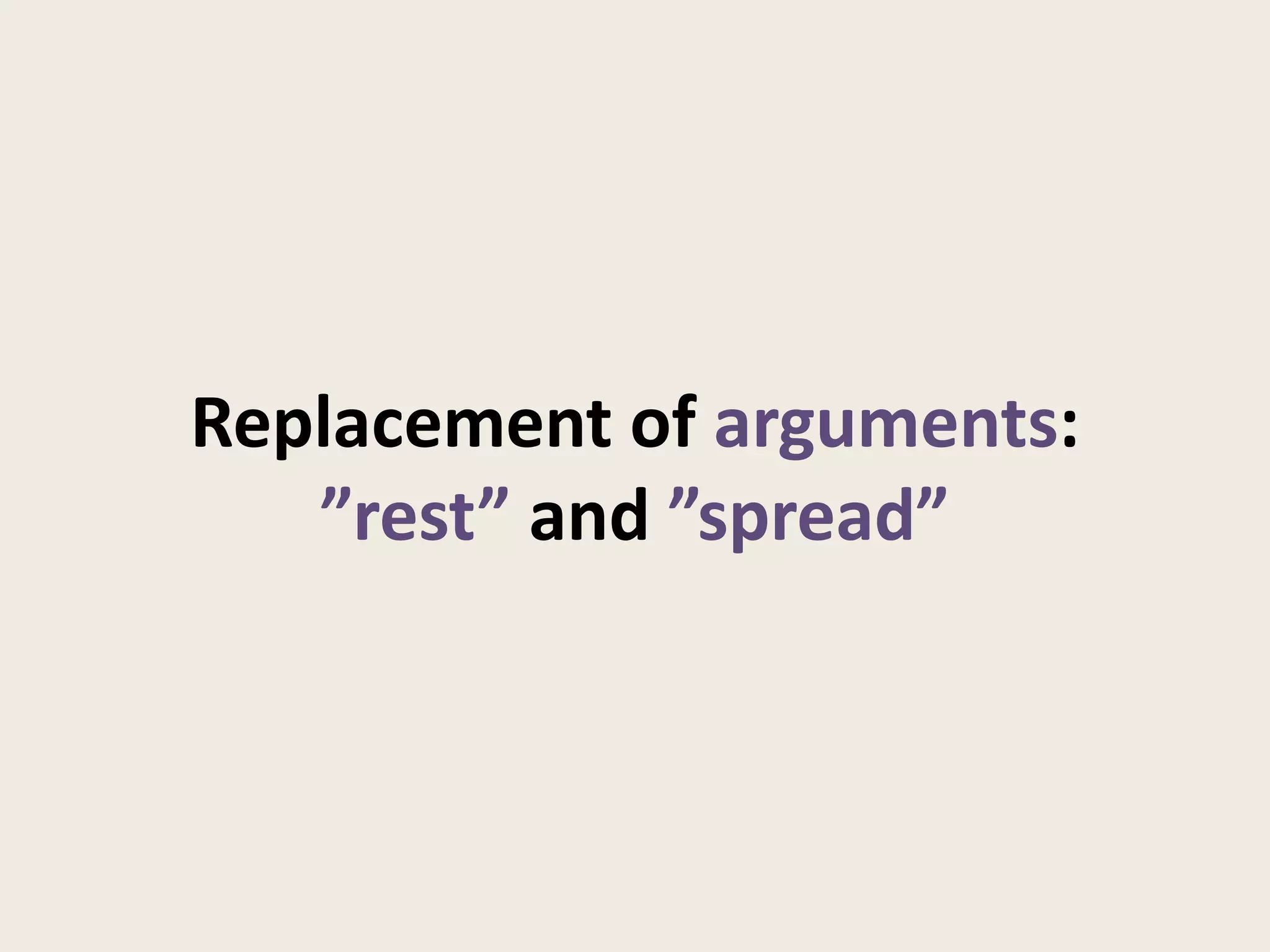
![Object arguments
// ES3, ES5
function format(pattern /*, rest */) {
var rest = [].slice.call(arguments, 1);
var items = rest.filter(function (x) { return x > 1});
return pattern.replace(“%v”, items);
}
format(“scores: %v”, 1, 5, 3); // scores: 5, 3](https://image.slidesharecdn.com/falsyvalues-dmitrysoshnikov-ecmascript6-110521101237-phpapp01/75/FalsyValues-Dmitry-Soshnikov-ECMAScript-6-24-2048.jpg)
![Good bye, arguments
// ES3, ES5
function format(pattern /*, rest */) {
var rest = [].slice.call(arguments, 1); // complicated
var items = rest.filter(function (x) { return x > 1});
return pattern.replace(“%v”, items);
}
format(“scores: %v”, 1, 5, 3); // scores: 5, 3](https://image.slidesharecdn.com/falsyvalues-dmitrysoshnikov-ecmascript6-110521101237-phpapp01/75/FalsyValues-Dmitry-Soshnikov-ECMAScript-6-25-2048.jpg)
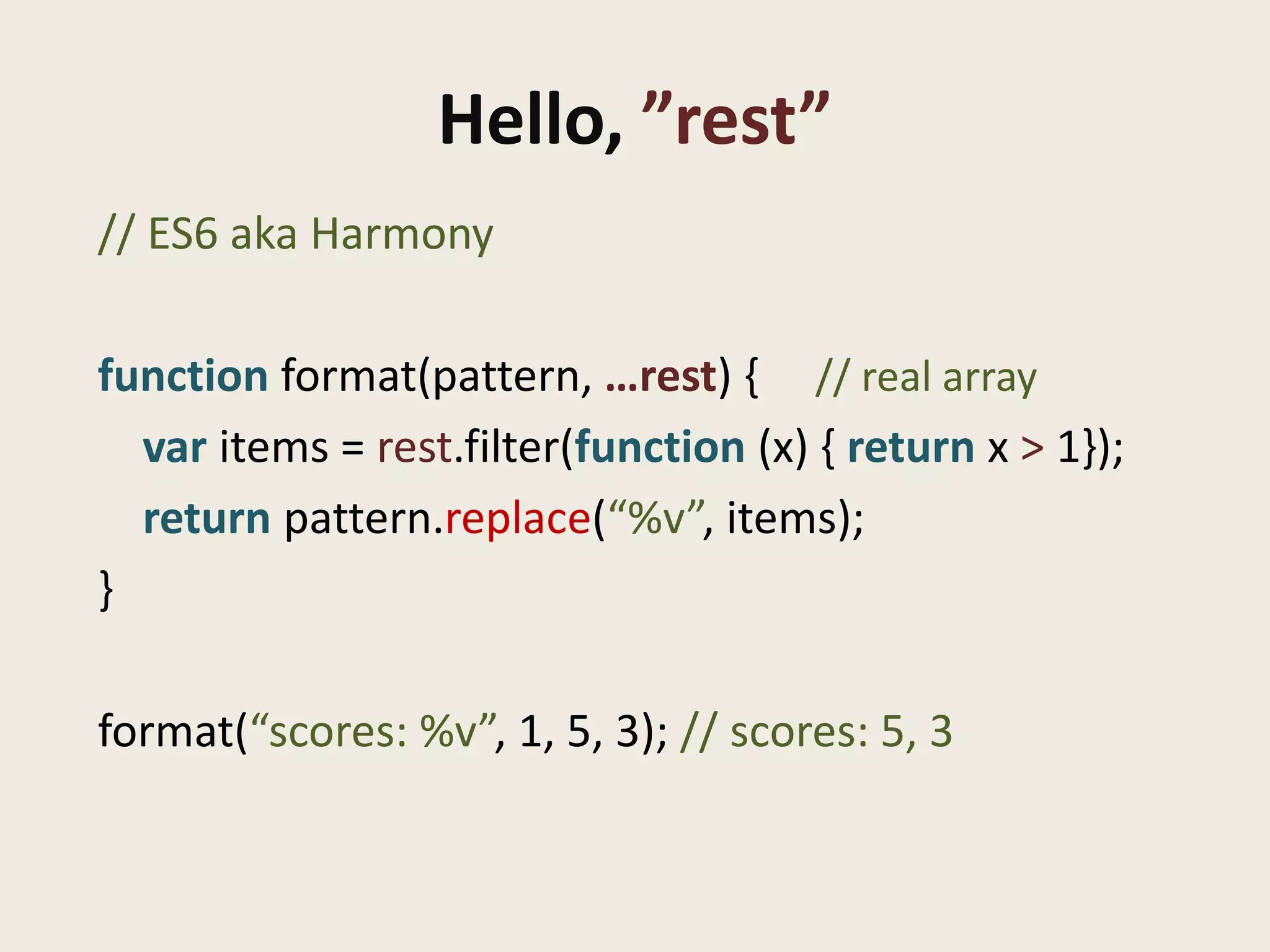
![And also ”spread”
// ES6 aka Harmony
function showUser(name, age, weight) {
return name + “:” + age + weight;
}
let user = [“Alex”, 28, 130];
showUser(…user); // ok
showUser.apply(null, user); // desugared](https://image.slidesharecdn.com/falsyvalues-dmitrysoshnikov-ecmascript6-110521101237-phpapp01/75/FalsyValues-Dmitry-Soshnikov-ECMAScript-6-27-2048.jpg)
![”rest” of arrays with destructuring
// ES6 aka Harmony
let userInfo = [“John”, 14, 21, 3];
let [name, ...scores] = userInfo;
console.log(name); // “John”
console.log(scores); // [14, 21, 3]](https://image.slidesharecdn.com/falsyvalues-dmitrysoshnikov-ecmascript6-110521101237-phpapp01/75/FalsyValues-Dmitry-Soshnikov-ECMAScript-6-28-2048.jpg)

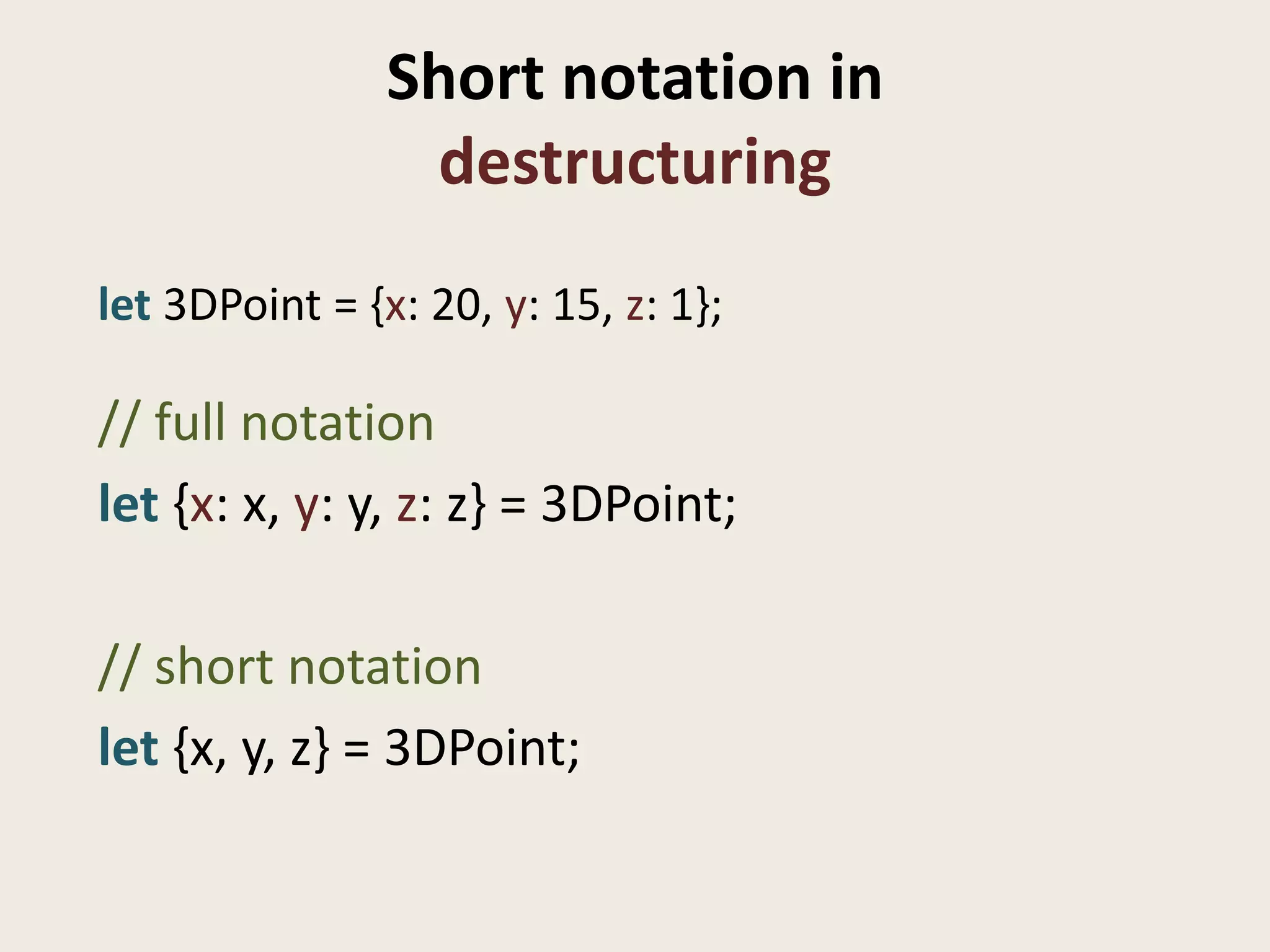
![Short syntax of functions.
-> functions
// casual functions
[1, 2, 3].map(function (x) { return x * x; }); // [1, 4, 9]
// -> functions
[1, 2, 3].map((x) -> x * x); // [1, 4, 9]
Syntactically:
• optional return;
• -> instead of function
• No curly braces are required](https://image.slidesharecdn.com/falsyvalues-dmitrysoshnikov-ecmascript6-110521101237-phpapp01/75/FalsyValues-Dmitry-Soshnikov-ECMAScript-6-31-2048.jpg)
![-> functions: examples
// Empty arrow function is minimal-length
let empty = ->;
// Expression bodies needs no parentheses or braces
let square= (x) -> x * x;
// Without parameters
let getUser = -> users[current];
// Statement body needs braces
let users = [{name: “Mark”, age: 28}, {name: “Sarah”, age: 26}];
users.forEach((user, k) -> { if (k > 2) console.log(user.name, k) });](https://image.slidesharecdn.com/falsyvalues-dmitrysoshnikov-ecmascript6-110521101237-phpapp01/75/FalsyValues-Dmitry-Soshnikov-ECMAScript-6-32-2048.jpg)
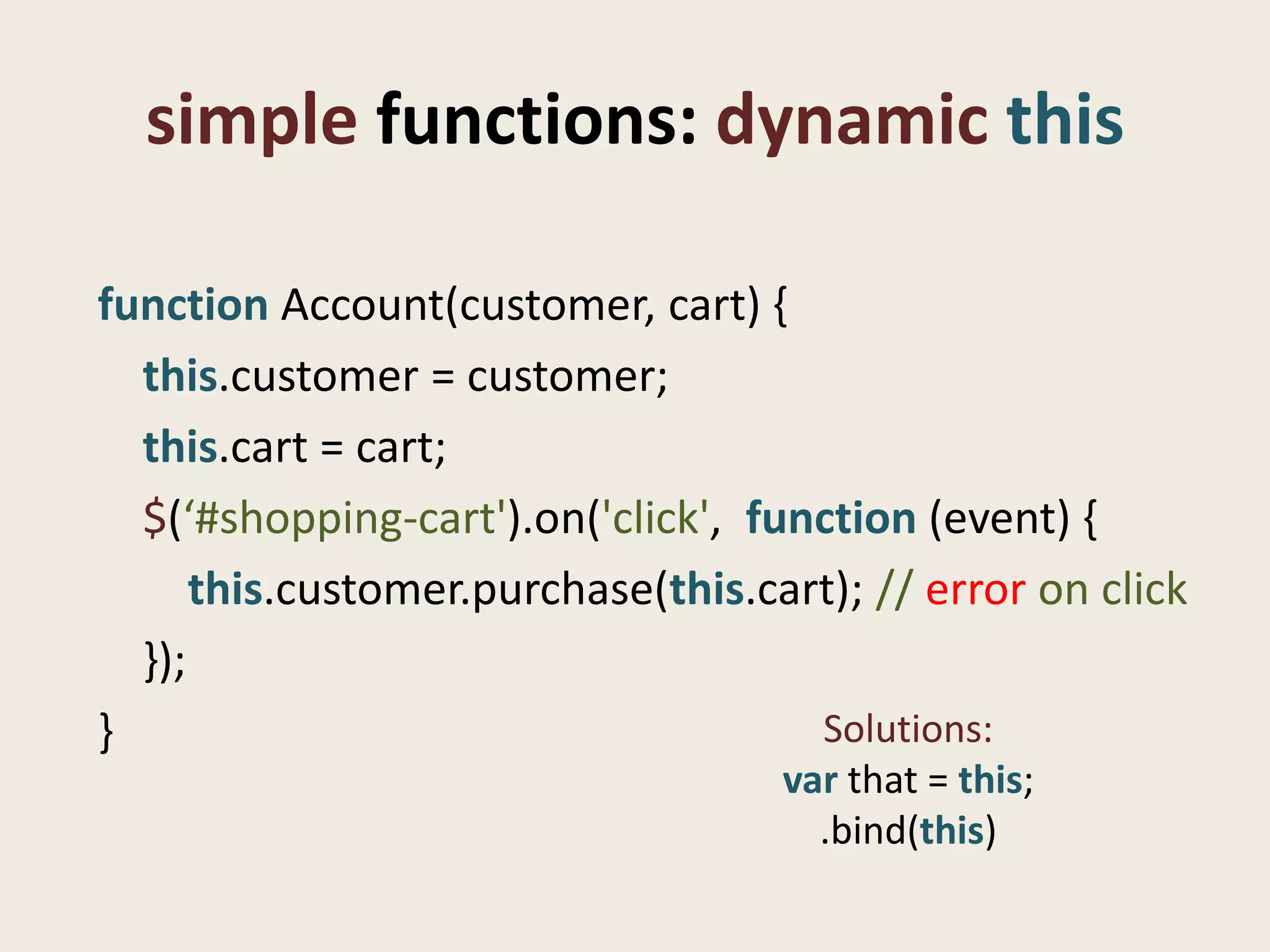
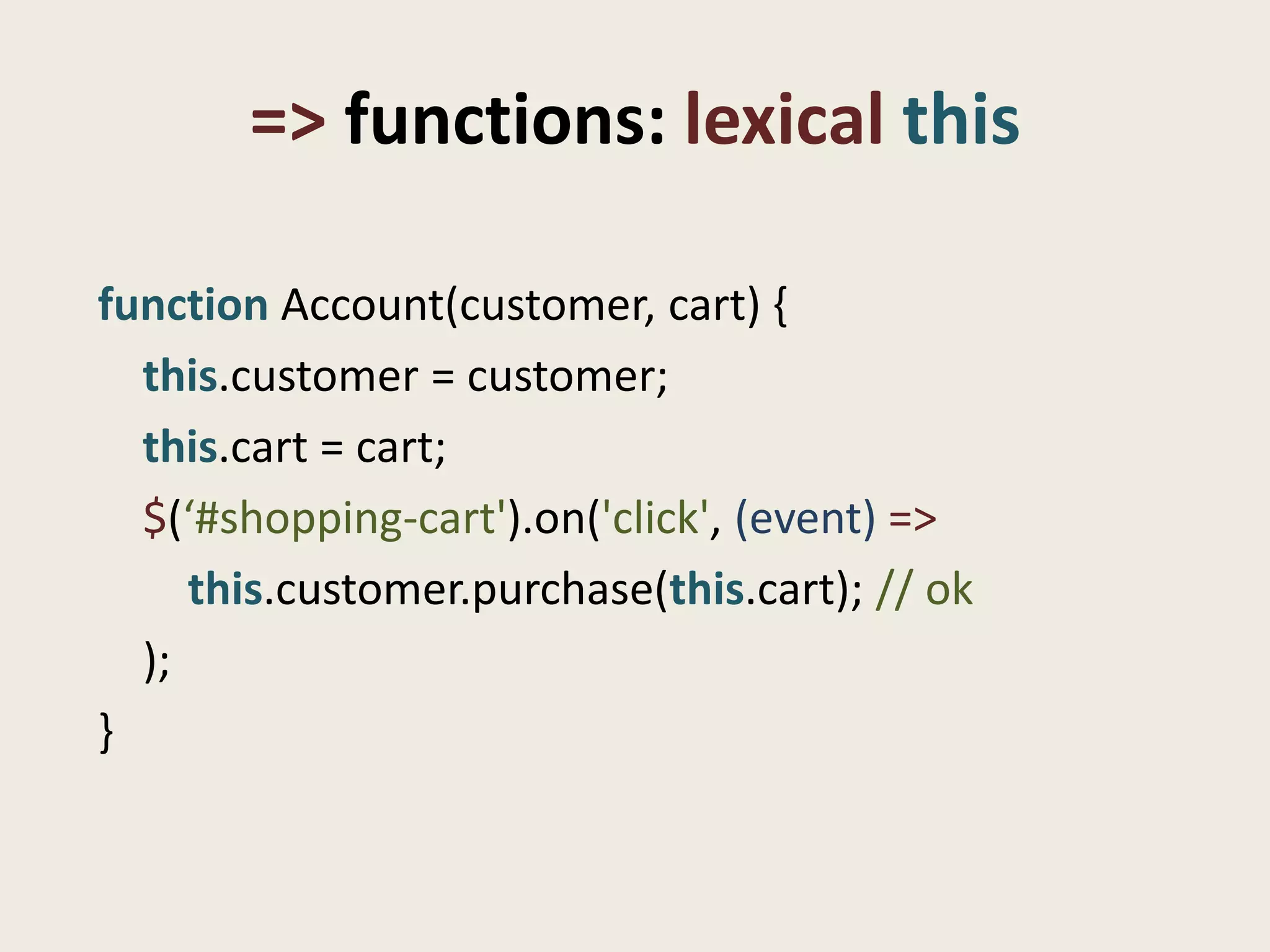

![Short syntax of functions.
Block-functions
// casual functions
[1, 2, 3].map(function (x) { return x * x; }); // [1, 4, 9]
// block-functions, Ruby’s way
[1, 2, 3].map {|x| x * x} // [1, 4, 9]
Syntactically:
• optional return;
• |x| instead of function
• No call parens](https://image.slidesharecdn.com/falsyvalues-dmitrysoshnikov-ecmascript6-110521101237-phpapp01/75/FalsyValues-Dmitry-Soshnikov-ECMAScript-6-36-2048.jpg)

![Proxy-objects
/* handler –meta-level handler
* proto – prototype of the proxy object */
Proxy.create(handler, [proto])
/* handler – meta-handler
* call – call trap
* construct – construction trap */
Proxy.createFunction(handler, [call, [construct]])
See: http://wiki.ecmascript.org/doku.php?id=harmony:proxies](https://image.slidesharecdn.com/falsyvalues-dmitrysoshnikov-ecmascript6-110521101237-phpapp01/75/FalsyValues-Dmitry-Soshnikov-ECMAScript-6-38-2048.jpg)
![Proxy-objects
// original object // proxied object
let point = { let loggedPoint = Proxy.create({
x: 10, get: function (rcvr, name) {
y: 20 console.log(“get: ”, name);
}; return point[name];
},
set: function (rcvr, name, value) {
Trap of getting of console.log(“set: ”, name, value);
properties
point[name] = value;
}
Trap of setting the }, Object.getPrototypeOf(point));
properties](https://image.slidesharecdn.com/falsyvalues-dmitrysoshnikov-ecmascript6-110521101237-phpapp01/75/FalsyValues-Dmitry-Soshnikov-ECMAScript-6-39-2048.jpg)
![Proxy-objects
// proxied object
Meta-handler let loggedPoint = Proxy.create({
get: function (rcvr, name) {
// reading trap console.log(“get: ”, name);
loggedPoint.x; // get: x, 10 return point[name];
},
// writing trap set: function (rcvr, name, value) {
loggedPoint.x = 20; // set: x, 20 console.log(“set: ”, name, value);
point[name] = value;
// reflected on the original object }
point.x; // 20 }, Object.getPrototypeOf(point));](https://image.slidesharecdn.com/falsyvalues-dmitrysoshnikov-ecmascript6-110521101237-phpapp01/75/FalsyValues-Dmitry-Soshnikov-ECMAScript-6-40-2048.jpg)
![Callable Proxy-objects
// original object // proxied object
let point = {x: 10, y: 20}; let loggedPoint = Proxy.createFunction({
get: function (rcvr, name) {
function callTrap() { console.log(“get: ”, name);
console.log(“call”); return foo[name];
} },
set: function (rcvr, name, value) {
function constructTrap() {
console.log(“set: ”, name, value);
console.log(“construct”);
foo[name] = value;
}
}
}, callTrap, constructTrap);
loggedPoint(10, 20);
new loggedPoint(100);
Catching of
Catching of calling
construction](https://image.slidesharecdn.com/falsyvalues-dmitrysoshnikov-ecmascript6-110521101237-phpapp01/75/FalsyValues-Dmitry-Soshnikov-ECMAScript-6-41-2048.jpg)
![Proxy : simple generic read logger
function logged(object) {
return Proxy.create({
get: function (rcvr, name) {
console.log(“get:”, name);
return object[name];
}
}, Object.getPrototypeOf(object));
}
let connector = logged({
join: function (node) { ... }
});
connector.join(“store@master-node”); // get: join](https://image.slidesharecdn.com/falsyvalues-dmitrysoshnikov-ecmascript6-110521101237-phpapp01/75/FalsyValues-Dmitry-Soshnikov-ECMAScript-6-42-2048.jpg)
![Proxy : examples
// loggers (on reading and writing)
Proxy.create(logHandler(object));
// multiple inheritance (delegation-based mixins)
Proxy.create(mixin(obj1, obj2));
// noSuchMethod
Proxy.create(object, noSuchMethod)
// Arrays with negative indices (as in Python)
let a = Array.new([1, 2, 3]);
console.log(a[-1]); // 3
a[-1] = 10; console.log(a); // [1, 2, 10]
See: https://github.com/DmitrySoshnikov/es-laboratory/tree/master/examples](https://image.slidesharecdn.com/falsyvalues-dmitrysoshnikov-ecmascript6-110521101237-phpapp01/75/FalsyValues-Dmitry-Soshnikov-ECMAScript-6-43-2048.jpg)

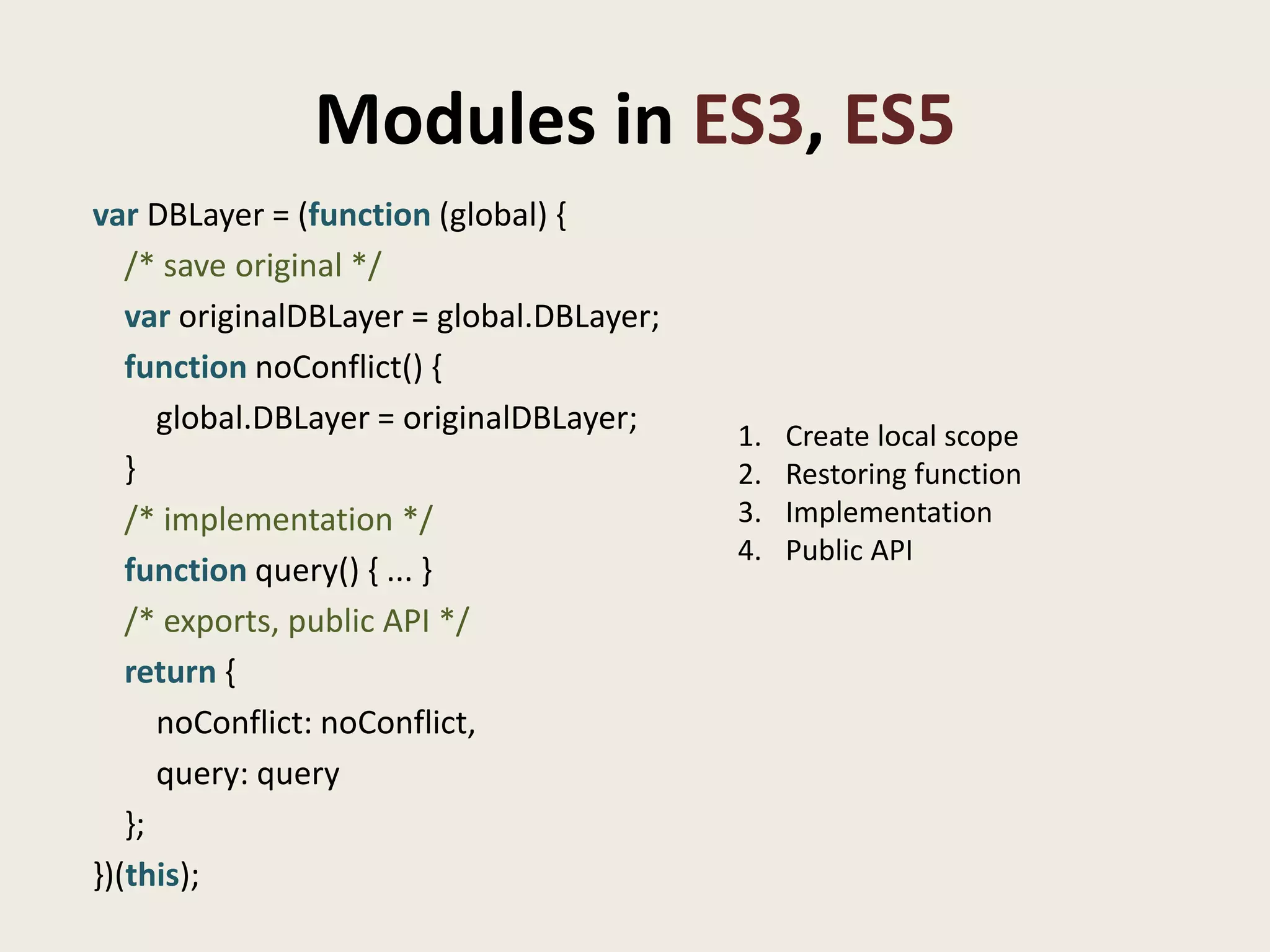
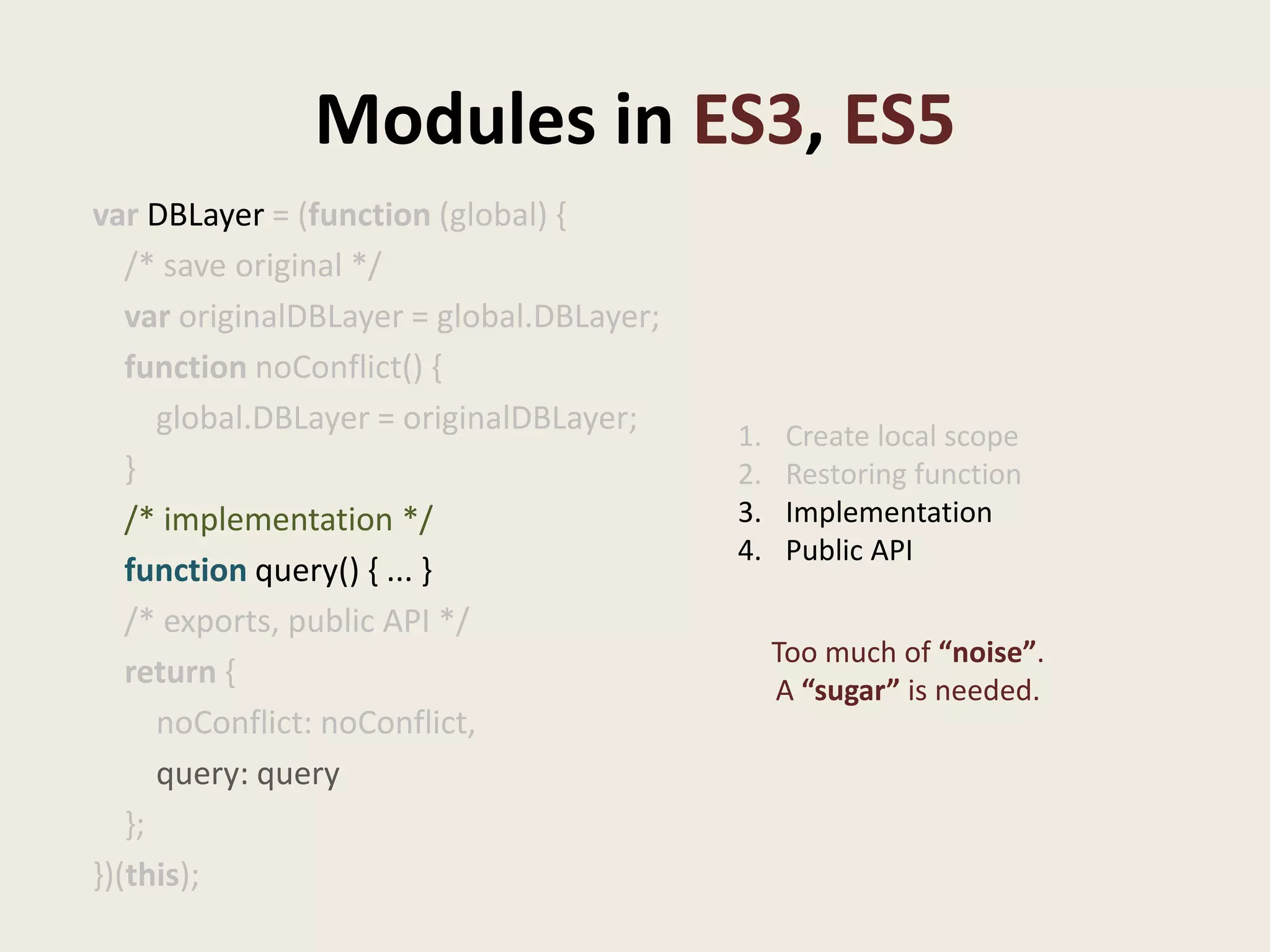
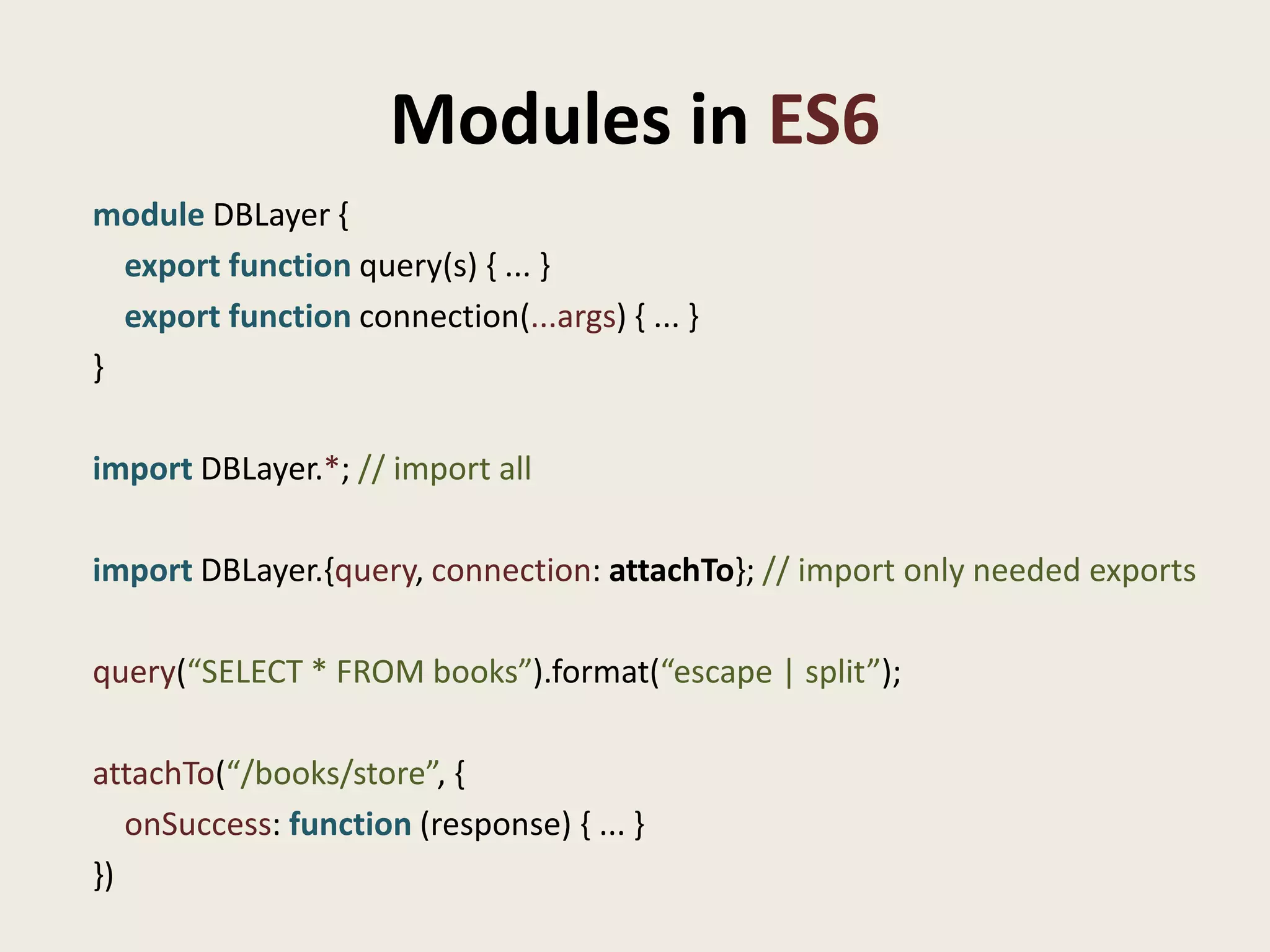
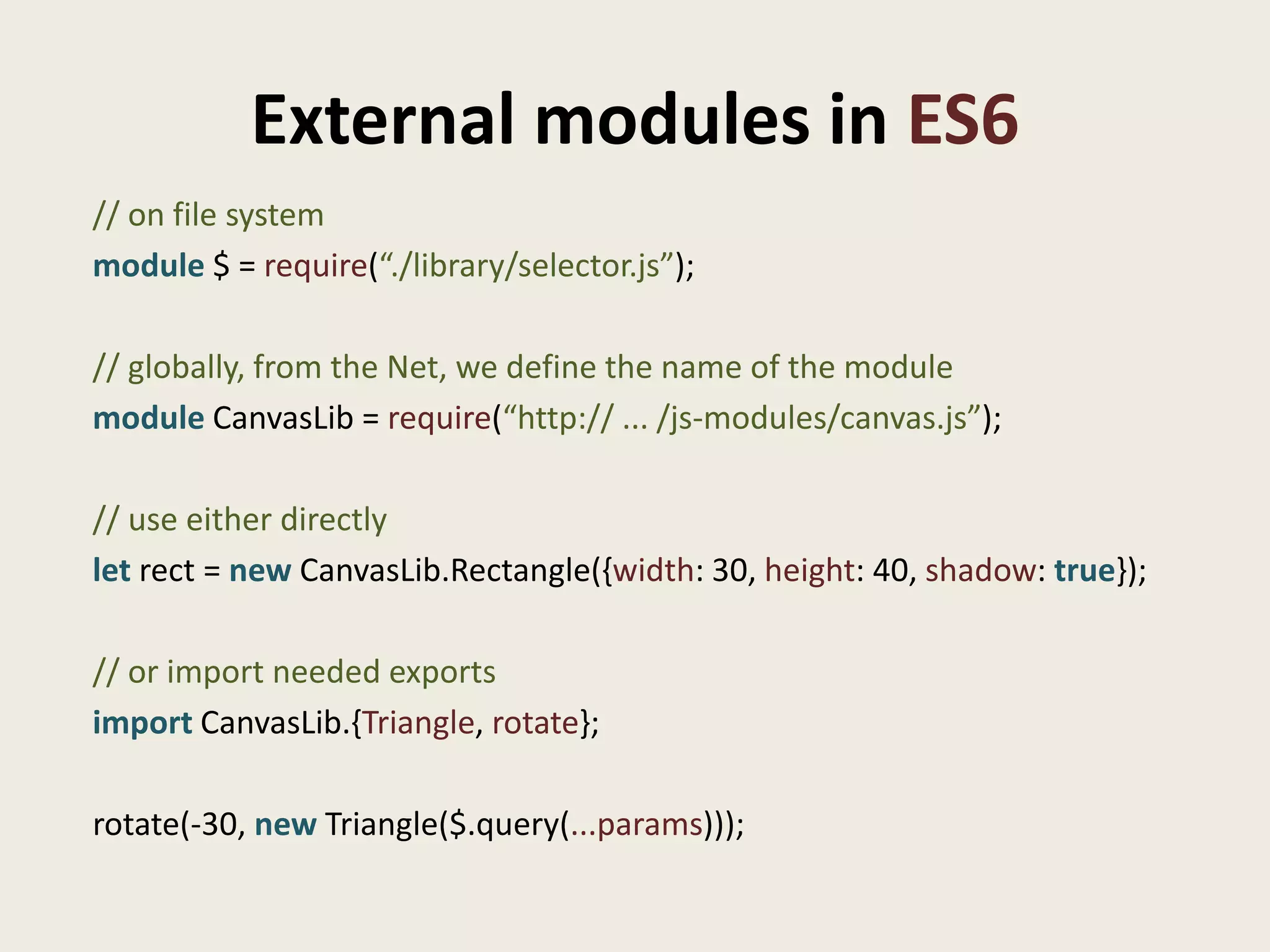
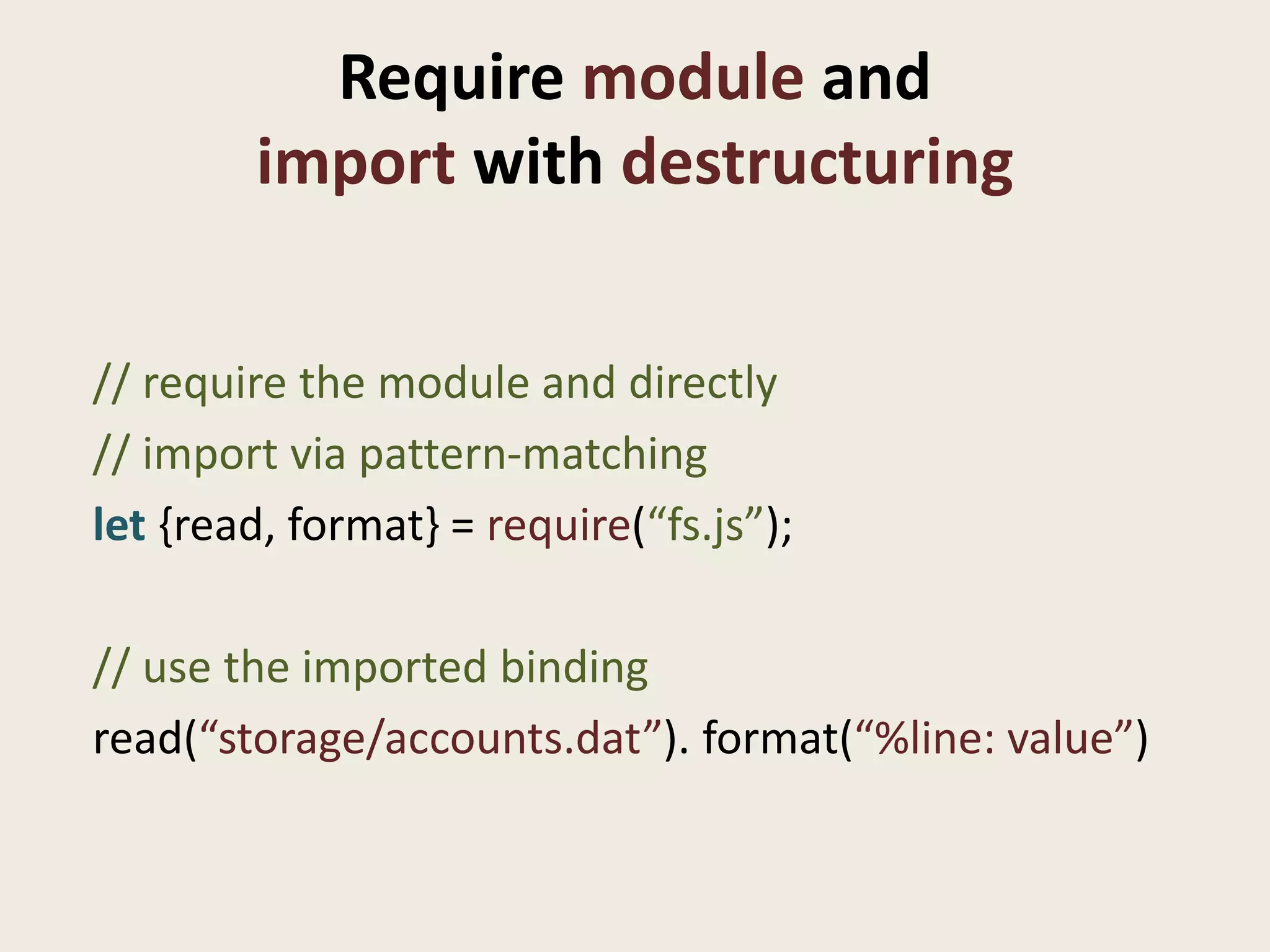
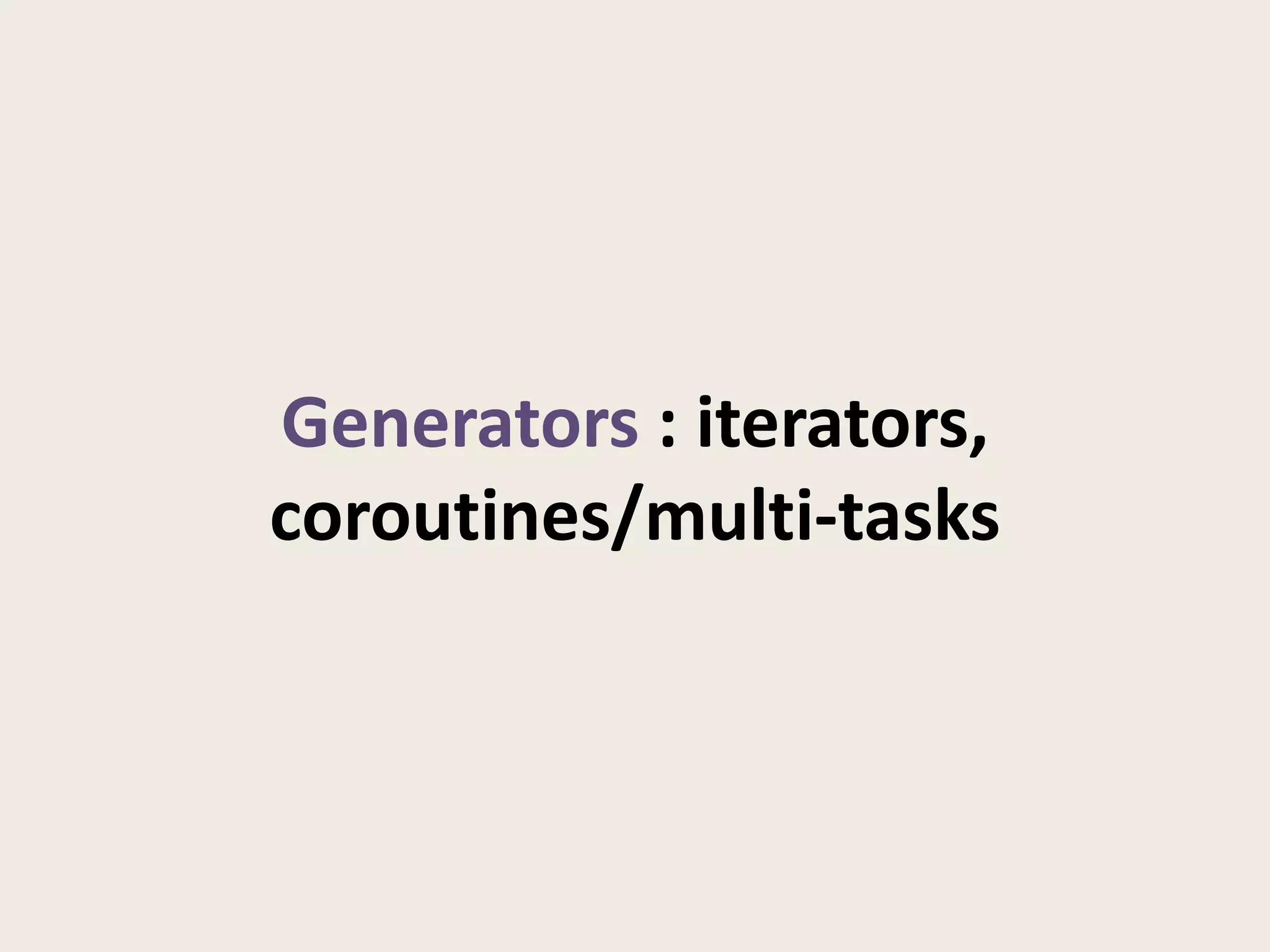
![Generators : yield
“infinite” streams
function fibonacci() {
let [prev, curr] = [0, 1];
while (true) {
[prev, curr] = [curr, prev + curr];
yield curr;
Next
entry point Manual iteration:
}
} let seq = fibonacci();
seq.next(); // 1
for (let n in fibonacci()) { seq.next(); // 2
seq.next(); // 3
// truncate the sequence at 1000 seq.next(); // 5
if (n > 1000) break; // 1, 2, 3, 5, 8 ... seq.next(); // 8
console.log(n);
}](https://image.slidesharecdn.com/falsyvalues-dmitrysoshnikov-ecmascript6-110521101237-phpapp01/75/FalsyValues-Dmitry-Soshnikov-ECMAScript-6-51-2048.jpg)
![Generators : yield
custom iterators
function iterator(object) {
for (let k in object) {
yield [k, object[k]]; Proposed iterators of ES6:
} // by properties (key+value)
for (let [k, v] in properties(foo))
}
// by values
let foo = {x: 10, y: 20}; for (let v in values(foo))
for (let [k, v] in iterator(foo)) { // by property names
console.log(k, v); // x 10, y 20 for (let k in keys(foo))
}
See: http://wiki.ecmascript.org/doku.php?id=strawman:iterators
See: https://gist.github.com/865630](https://image.slidesharecdn.com/falsyvalues-dmitrysoshnikov-ecmascript6-110521101237-phpapp01/75/FalsyValues-Dmitry-Soshnikov-ECMAScript-6-52-2048.jpg)
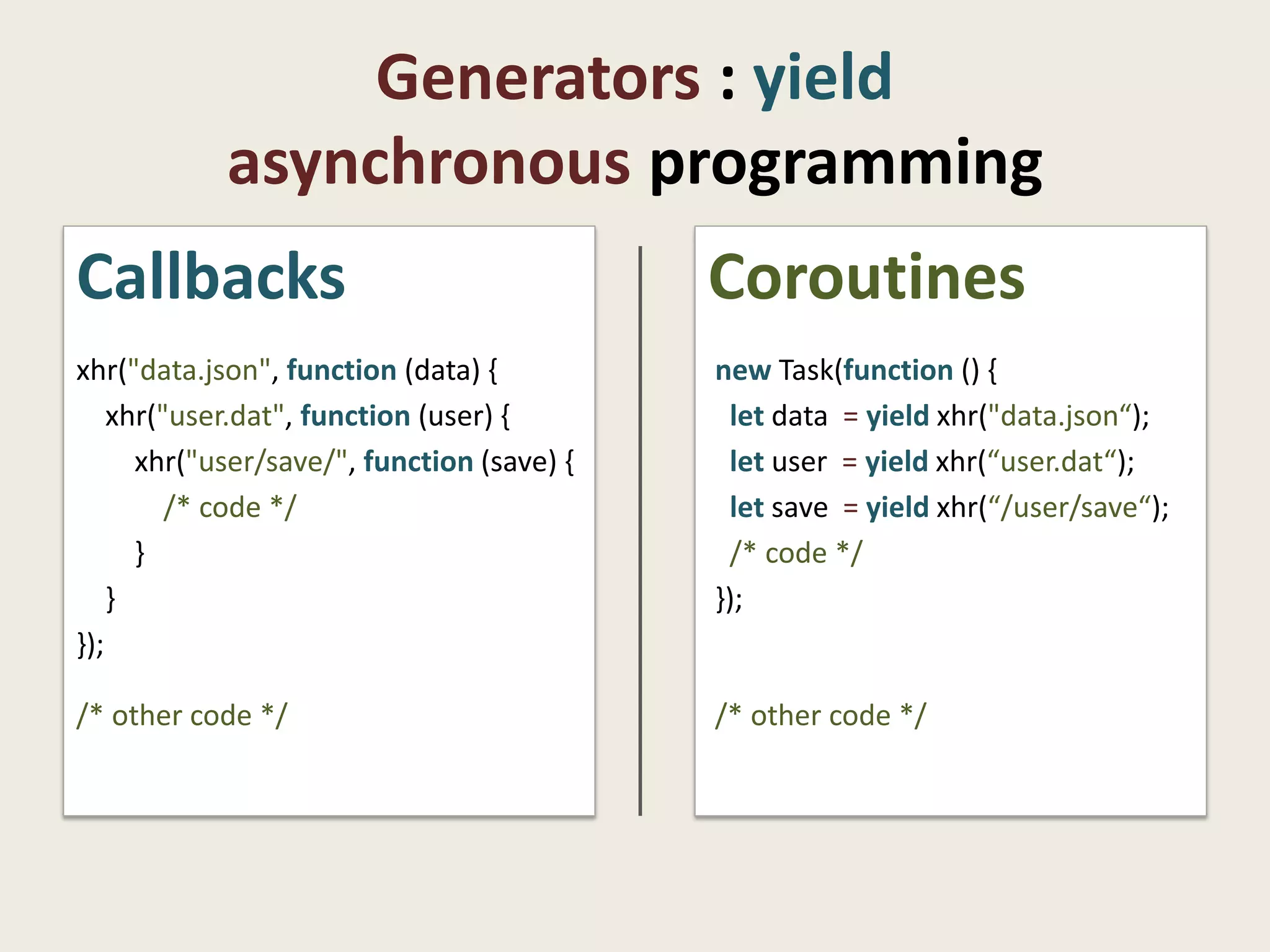
![Generators : yield
cooperative multitasks (threads)
let thread1 = new Thread(function (...args) {
for (let k in values([1, 2, 3])) yield k + “ from thread 1”;
}).start();
let thread2 = new Thread(function (...args) {
for (let k in values([1, 2, 3])) yield k + “ from thread 2”;
}).start();
// 1 from thread 1
// 2 from thread 1
// 1 from thread 2
// 3 from thread 1
// 2 from thread 2
// etc.](https://image.slidesharecdn.com/falsyvalues-dmitrysoshnikov-ecmascript6-110521101237-phpapp01/75/FalsyValues-Dmitry-Soshnikov-ECMAScript-6-54-2048.jpg)

![Array comprehensions
// map + filter way
let scores = [1, 7, 4, 9]
.filter(function (x) { return x > 5 })
.map(function (x) { return x * x }); // [49, 81]](https://image.slidesharecdn.com/falsyvalues-dmitrysoshnikov-ecmascript6-110521101237-phpapp01/75/FalsyValues-Dmitry-Soshnikov-ECMAScript-6-56-2048.jpg)
![Array comprehensions
// map + filter way
let scores = [1, 7, 4, 9]
.filter(function (x) { return x > 5 })
.map(function (x) { return x * x }); // [49, 81]
// array comprehensions
let scores = [x * x for (x in values([1, 7, 4, 9])) if (x > 5)];](https://image.slidesharecdn.com/falsyvalues-dmitrysoshnikov-ecmascript6-110521101237-phpapp01/75/FalsyValues-Dmitry-Soshnikov-ECMAScript-6-57-2048.jpg)
